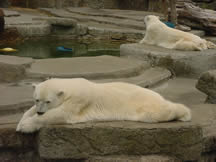San Francisco Zoo
The San Francisco Zoo is one of the larger zoos in the area. It is located in San Francisco on 45th Ave. The zoo is open from 10-5, Monday through Friday. The children's zoo is open from 11A.M. to 4 P.M. Admission is $11.00 for adults and $4.00 for children 3-11. The zoo also offers discounted admission for school groups. Admission includes access to the main zoo, the children's zoo, the insect zoo, and the barnyard. To arrange a visit to the zoo call (415) 753-7057. For a guided tour call (415) 753-7073. In addition to free tours, a conversation & science tour is offered for a nominal fee. Some of the tours available are: African Animals(grades 1,2); Animal Adaptations(all ages); Endangered Species(3rd grade--adult); Rain Forest Animals(2nd grade--adult); and Zoo Babies(all ages).
Standards:First grade standard 2 of the
life sciences: Plants and animals meet their needs in different ways.
As a basis for understanding this concept:
a. Students know different plants and animals inhabit different kinds
of environments and have external features that help them thrive in different
kinds of places.
b. Students know both plants and animals need water, animals need food,
and plants need light.c. Students know animals eat plants or other animals
for food and may also use plants or even other animals for shelter and
nesting.
d. Students know how to infer what animals eat from the shapes of their
teeth (e.g., sharp teeth: eats meat; flat teeth: eats plants).
Second grade life sciences standard 2: Plants
and animals have predictable life cycles. As a basis for understanding
this concept:
a. Students know that organisms reproduce offspring of their own kind
and that the offspring resemble their parents and one another.
b. Students know the sequential stages of life cycles are different for
different animals, such as butterflies, frogs, and mice.
c. Students know many characteristics of an organism are inherited from
the parents. Some characteristics are caused or influenced by the environment. d.
Students know there is variation among individuals of
one kind within a population.
d.
Students know there is variation among individuals of
one kind within a population.
Third grade life sciences standard 3: Adaptations
in physical structure or behavior may improve an organism's chance for
survival. As a basis for understanding this concept:
a. Students know plants and animals have structures that serve different
functions in growth, survival, and reproduction.
b. Students know examples of diverse life forms in different environments,
such as oceans, deserts, tundra, forests, grasslands, and wetlands.
c. Students know living things cause changes in the environment in which
they live: some of these changes are detrimental to the organism or other
organisms, and some are beneficial.